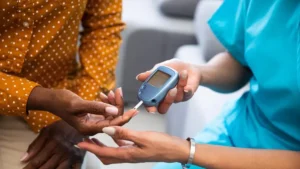Diabetes is not just a physical condition; it impacts every aspect of life, including emotional and psychological health. One lesser-known side effect of diabetes is “diabetic rage,” a state of intense anger and frustration that can occur when blood glucose levels are not well-managed. Diabetic rage can strain personal relationships, affect professional life, and severely impact mental health. In this blog, we will explore what diabetic rage is and effective diabetic rage treatment strategies for managing it, ensuring a pathway to emotional stability and overall wellness.
Contents
Can Diabetes Make You Feel Angry?
 Yes, diabetes can indeed affect your emotions and mood, potentially leading to feelings of anger and frustration. This phenomenon is often linked to fluctuations in blood glucose levels, which can have a significant impact on how you feel. Here’s how:
Yes, diabetes can indeed affect your emotions and mood, potentially leading to feelings of anger and frustration. This phenomenon is often linked to fluctuations in blood glucose levels, which can have a significant impact on how you feel. Here’s how:
- Low Blood Glucose (Hypoglycemia): When your blood glucose levels drop too low, it can lead to feelings of irritability, confusion, and even aggression. The body sees this as a state of emergency, triggering a fight-or-flight response that can make you feel angry or hostile.
- High Blood Glucose (Hyperglycemia): Similarly, when blood glucose levels are too high, it can lead to fatigue, stress, and difficulty concentrating. This might contribute to feelings of frustration and anger.
- Emotional Stress: Living with diabetes can also be stressful due to the constant monitoring of blood sugar, managing diet, and worrying about potential complications. This chronic stress can lead to mood swings and irritability.
- Diabetes Distress: This is a term used to describe the unique emotional issues that come with managing diabetes. It can include feeling overwhelmed by diabetes management, fearing complications, and feeling angry about having to deal with the condition.
People with diabetes and their loved ones need to recognize that these feelings of anger can be a part of living with the condition. Acknowledging them as legitimate and seeking appropriate coping strategies can be crucial steps in managing diabetes more effectively.
What Are Some Diabetic Rage Treatment?
 Diabetic rage treatment effectively requires a multifaceted approach, targeting both the physical aspects of diabetes management and the emotional or psychological factors. Here are some strategies that can help:
Diabetic rage treatment effectively requires a multifaceted approach, targeting both the physical aspects of diabetes management and the emotional or psychological factors. Here are some strategies that can help:
Tight Glucose Control
- Regular Monitoring: Consistent checking of blood glucose levels using a glucometer or continuous glucose monitoring (CGM) system allows for immediate adjustments to diet, exercise, or medication. This proactive approach helps to avoid the glucose fluctuations that can lead to mood changes.
- Diet and Exercise: A dietitian can help design a meal plan that stabilizes blood sugar levels through a balanced intake of carbohydrates, proteins, and fats. Combined with regular physical activity, which helps to use glucose as energy and improves insulin sensitivity, this strategy is foundational for both physical and emotional health.
- Medication Adherence: Taking all medications as prescribed, including timely insulin injections for those who require them, ensures that blood glucose levels remain within target ranges. Adjustments to medication types or dosages should always be done under medical supervision.
Stress Management Techniques
- Mindfulness and Meditation: Practices like mindfulness meditation, deep breathing exercises, and yoga can reduce the body’s stress response and promote a state of calm, making it easier to manage emotional reactions.
- Regular Exercise: Physical activities, whether it’s aerobic exercise, strength training, or just walking, release endorphins, the body’s natural mood elevators, and stress relievers.
- Hobbies and Interests: Engaging in activities that one finds enjoyable or fulfilling, such as painting, music, gardening, or reading, can serve as an effective distraction from stress and reduce feelings of anger.
Emotional and Psychological Support
- Counseling or Therapy: Mental health professionals can provide strategies for coping with the emotional challenges of living with diabetes. Cognitive-behavioral therapy (CBT), in particular, helps individuals identify and modify negative thought patterns and behaviors that contribute to emotional distress.
- Support Groups: Participating in support groups offers a sense of community and belonging. Sharing experiences and strategies with others who face similar challenges can reduce feelings of isolation and provide practical tips for managing diabetes and its emotional impacts.
Education and Awareness
- Learning About Diabetes: Gaining a thorough understanding of diabetes, including how it affects the body, the importance of glucose control, and the potential emotional impacts, can empower individuals to take charge of their health.
- Recognizing Early Signs: Educating oneself and loved ones about the signs of blood glucose imbalances (such as irritability, sweating, trembling, or confusion) enables quicker interventions to prevent emotional outbursts.
Improving Communication
- Expressing Needs: Openly discussing one’s feelings, experiences, and needs with family, friends, and healthcare providers can improve mutual understanding and support. Effective communication helps in setting realistic expectations and establishing a supportive network.
- Educating Loved Ones: Teaching those close to you about diabetes and its effects, including the potential for emotional volatility, can help them respond more empathetically and effectively during challenging times.
Professional Medical Advice
- Regular Check-Ups: Consistent medical oversight ensures that diabetes management plans are effective and adapt to changing health needs. Healthcare providers can offer valuable advice on managing both the physical and emotional aspects of diabetes.
- Mental Health Professionals: For those who experience significant emotional distress or diabetic rage, consulting with mental health professionals who have experience with chronic illness can be particularly beneficial. They can offer specialized interventions, such as stress management techniques, therapy for depression or anxiety, and strategies for improving overall emotional well-being.
By integrating these strategies into daily life, individuals living with diabetes can better manage their condition and reduce the incidence of diabetic rage, leading to improved quality of life.
What Are The Signs Of a Diabetic Rage Treatment Emergency?
 Recognizing the signs of a diabetic rage treatment emergency is crucial for ensuring timely and appropriate intervention. Here are key signs and situations that suggest a diabetic rage treatment emergency:
Recognizing the signs of a diabetic rage treatment emergency is crucial for ensuring timely and appropriate intervention. Here are key signs and situations that suggest a diabetic rage treatment emergency:
Extreme Blood Glucose Levels
Blood glucose levels that are dangerously low and do not respond to usual treatment methods can lead to confusion, loss of consciousness, or seizures. And, extremely high blood glucose levels, especially if accompanied by symptoms of diabetic ketoacidosis (DKA) like deep, rapid breathing, fruity-smelling breath, nausea, vomiting, and dehydration, require immediate medical attention.
Uncontrollable Emotional Outbursts
An inability to calm down or be reasoned with, particularly if the individual is usually able to manage their emotional responses with support or self-care strategies. These outbursts can pose safety risks to the individual or others.
Signs of Mental Confusion or Disorientation
Difficulty speaking, understanding others, or appearing confused about time, place, or identity. These signs might indicate severe hypoglycemia or other medical complications requiring urgent care.
Physical Aggression
Actions that pose a threat to the safety of the individual or those around them. This level of aggression might be out of character and indicates a loss of control that necessitates immediate intervention.
Self-Harming Behaviors
Any indication that the person is contemplating or engaging in self-harm as a result of emotional distress or confusion related to diabetes management.
Suicidal Ideation
Expressions of hopelessness or verbalization of suicidal thoughts. This requires immediate crisis intervention and professional support.
If any of these signs are present, it’s critical to take immediate action. Always err on the side of caution and seek professional medical or psychiatric assistance when in doubt. The priority is to stabilize the individual’s physical and emotional state, ensuring their safety and the safety of those around them.
Conclusion
In conclusion, diabetic rage treatment is crucial to address the emotional and psychological aspects that come with the condition. Recognizing the signs of diabetic rage and understanding how to effectively manage it through tight glucose control, stress management techniques, emotional support, education, improved communication, and professional advice can significantly improve quality of life. It’s essential to be proactive, seek help when needed, and remember that you’re not alone in this journey.
By taking a comprehensive approach to diabetes management that includes both physical and emotional health, individuals can lead fulfilling lives despite the challenges that diabetes may present. Do you want to get rid of diabetes? Join our online diabetes treatment program and reverse Diabetes naturally through lifestyle changes such as a Personalized Diet plan, Exercise, Yoga, dieticians, and health coaches.

